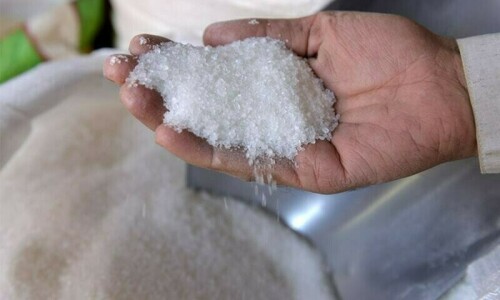BASED on 2012-13 data on cane crushing and sugar production released by the Pakistan Sugar Mills Association and assuming a 30pc average yield rate of bagasse from crushed sugarcane, 15m tonnes of bagasse were available in that year to potentially produce about 1,500MW electricity.
Facilitated by the ‘Framework for Power Co-generation 2013’ and other official policies, all stakeholders appear to have geared up to play a positive role in setting up bagasse-based power co-generation plants with high pressure boilers, with the Alternate Energy Development Board (AEDB) and Nepra processing documents on a fast-track basis.
The AEDB has already issued letters of intent (LoIs) to seven or possibly more investors and sugar mills, while Nepra has also started issuing generating licences to sugar mills and potential investors. The regulator issued upfront tariff on May 29, 2013, and decided that the option for accepting the upfront tariff by co-generation projects will be applicable up to May 28, 2015. So far, three sugar mills with total installed capacity of 102MW have accepted the upfront tariff.
Currently, a number of large business and industrial groups either directly or indirectly own more than one sugar mill. They are thus better placed to finance, install and operate high pressure boilers and modern generators.
The sugarcane crushing season normally lasts 120-150 days, whereas co-generation power plants based on bagasse could be operative for 300 days. For the remaining period, the plants can use cotton stalks, rice straws, maize cobs etc
Due to information gap regarding existing installed capacity for power generation, a reasonable guess could be made by assuming that each mill, on average, produces 9MW power using bagasse available during the cane crushing season. On this basis, the total generation of the 80 or so operative sugar mills would be 720MW.
According to a recent report by Nepra, about 16 sugar mills are supplying nearly 120MW power to discos. Perhaps other sugar mills are not able or presently willing to supply surplus power to Discos. With high pressure boilers, each sugar mill is assumed to produce 15MW from bagasse, leading to potential aggregate capacity of all sugar mills at 1,200 MW.
Thus, with the installation of high pressure boilers, additional capacity of around 480MW could become available for sale to the national grid.
Based on the approved cost of various tariff components, the levelised tariff based on a 30-year term has been worked out by Nepra at 10.6202 US cents per kWh, or Rs10.4078/kWh. The upfront tariff has been designed to promote new and efficient plants with the latest technology of higher pressure boilers to ensure optimal utilisation of this resource, so that more energy could be harnessed for a comparatively longer period.
According to another condition of the upfront tariff, co-generation projects are allowed to use other biomass fuels like rice husk, cotton stalk etc. in combination with bagasse (or separately). But the use of imported or local coal is not allowed. The sugarcane crushing season normally lasts 120-150 days, whereas co-generation power plants could be operative for 300 days. Estimates are that surplus bagasse saved during the crushing season can help co-generation plants to operate another 30-40 days. For the remaining days, the plants can use biomass resources such as cotton stalks, rice straws, maize cobs etc., which the rural people presently use as fuel for cooking and heating etc.
The authorities may consider promoting forests and cultivating of more such crops, or alternately, the capacity of co-generation plants may be kept suitably low so that more surplus bagasse is assured after the end of the cane crushing season.
In December 2009, the State Bank of Pakistan had provided financing for establishment of new power projects using renewable energy with capacities of up to 10MW, which has since been enhanced to 20MW. The sponsors of power projects can avail the financing facility through banks and DFIs for new imported and locally manufactured plant, machinery and equipment.
Published in Dawn, Economic & Business, October 6th, 2014
















































